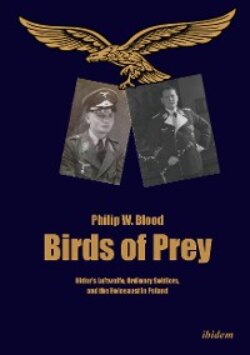Читать книгу Birds of Prey - Philip W. Blood - Страница 9
List of Images
ОглавлениеImage 1: left to right, Oberforstmeister Walter Frevert Rominten, Göring in his capacity as Reichsjägermeister and Oberstjägermeister Ulrich Scherping.
Image 2: Senior Luftwaffe and state foresters in the lounge area in Rominten. A painting of a European Bison is hung on the far wall.
Image 3: European Bison in Białowieźa.
Image 4: Reichsmarschall Göring, Lw.Generalmajor Adolf Galland, Lw.Generaloberst Bruno Loerzer and Reichminister Albert Speer, August 1943.
Image 5: Bernd von Brauchitsch in his cell in Nuremberg prison 1946.
Image 6: Preparation for a diplomatic function at Rominten. Note the Nordic runes on the picture rail under the ceiling.
Image 7: Sites of memory—Located beside the railway in Zabłotczyzna (2 miles from Narewka), the memorial refers to approximately 500 Jews killed on 5 August 1941. The German records show 282 Jewish men were killed at that place on 15 August 1941.
Image 8: A German Army Ortskommandtur: issuing daily notices and labour assignments.
Image 9: Captured Soviet partisans after interrogation but before execution.
Image 10: Armed trusty and Nazi Collaborator.
Image 11: Białowieźa forest—partisan memorial in the conservation area.
Image 12: Civilian deportations and allocation to work or forced labour duties.
Image 13: Villages destroyed and cattle taken under the Nazi food plan.
Image 14: Luftwaffe troops in company order.
Image 15: Luftwaffe troops in action in the forest.
Image 16: Wounded Luftwaffe troops recovering in a military hospital.
Image 17: Typical strongpoint construction in wood.
Image 18: Reichsjägermeister Göring and his prize— Matador —the ceremony for the dead stag—22 September1942
Image 19: The signals was regarded as the advanced branch of the Luftwaffe. Recruits received a full training schedule equivalent to apprenticeships in industry.
Image 20: Sites of memory—Soviet military cemetery located within Hajnówka town. Engraving reads: Hero of the Soviet Union, Guards Junior Lieutenant Aleksii Vasilevich Florenko. Born 6 February 1922. He died in the fight to liberate Hajnówka region 25 July 1944.
Image 21: Sites of memory—located in the centre of Białowieźa town, the memorial stands on the site where public executions were conducted during the Nazi occupation.
Image 22: Sites of memory—located within the Narewka town limits, the Jewish cemetery survived the Nazi occupation.
Image 23: Sites of memory—located nearby Białowieźa town. They are memorials to the mass killings and destroyed villages in 1942. They stand in the grounds of the former German military cemetery, first constructed during the Imperial German Army occupation in 1915-18.
Image 24: In his position as General of Fighters, Adolf Galland approved and endorsed this anti-Semitic trope in comic form. The connections between hunting, the Luftwaffe and training had reached complete integration.
Image 25: Sites of memory—German dead relocated from Białowieźa cemetery. The search for Siegfried Adams burial place marked by my index finger.
Image 26: Heimatkriegsgebiet - Luftwaffe troops in training building small unit cohesion.
Image 27: Dress uniforms and other duties.
Image 28: The Luftwaffe troops assigned to the LWSB/JSKB were generally young and often reassigned from non-combat branches.
